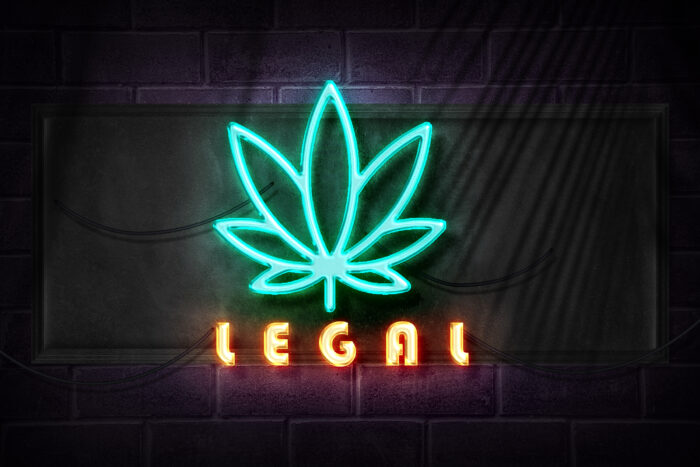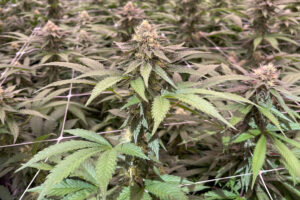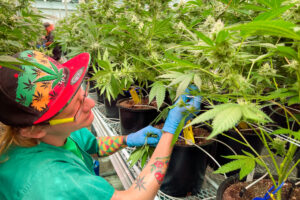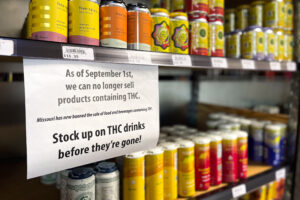5:55
News Story
Jack Maritz was working at Delta Extraction, a marijuana manufacturing facility in Robertsville, in February 2023 when the company’s regular state compliance officer stopped by unannounced.
The officer, Heather Bilyeu, wanted to make sure Delta had “accurate counts” in the state’s tracking database of how much THC distillate, or concentrated THC oil, they had in the building.
“We weighed every jar of distillate that we had together,” Maritz, the manager of the facility and part owner, said in a hearing Wednesday. “She watched me weigh it.”
Then she asked Maritz “a lot” of questions, he said, about how the company made the distillate, which is the ingredient that produces a high in edibles and vape pens.
Delta’s distillate was different from other licensed manufacturers’ products in the state because it was mostly made up of what some call a “synthetic” THC — or THC that had been converted from hemp’s CBD using a heavy chemical process. Delta mixed the hemp-derived THC with a small amount of THC from marijuana grown in Missouri.
It’s much less expensive to make distillate from hemp than Missouri-grown marijuana, but Delta’s consumers still paid marijuana prices.
Bilyeu’s visit came the day before the new state marijuana rules went into effect on Feb. 3, 2023 — which banned the converted hemp THC practice. Maritz said Bilyeu wanted to make sure Delta had stopped making it, but she didn’t stop the company from selling about 400 liters they had weighed together.
Over the next few months, that hemp-based distillate became among the top selling in the state and was added to millions of edibles and vape cartridges.
“She was completely aware that we’re going to keep selling it and that it was converted material,” Maritz said. “And there was obviously no recall for health and safety after that.”
For the last five months, Missouri’s cannabis industry has largely been kept in the dark about why the state suddenly issued a massive recall in August of marijuana products that contained Delta’s hemp-based distillate.
In August, the state told the Administrative Hearing Commission that a July investigation uncovered Delta’s practice of using hemp-derived THC — citing several examples of distillate made as early as March 2022 when the company began operations.
However, testimony and evidence revealed during this week’s appeal hearing challenging Delta’s license revocation and the product recall show for the first time that the state was aware of those examples long before the recall was issued.
Throughout the three-day hearing before the commission, the state remained firm that Delta had committed “inversion,” which is where a Missouri cannabis company adds illegal marijuana products brought in from other states to their own products in order to keep their production numbers up.
Brittany Kirkweg, facility compliance manager for the Division of Cannabis Regulation, said the “unregulated THC” product posed a public health threat.
“We would not be doing our job as regulators if we allowed a licensee and product that is unregulated THC to be available to patients and consumers,” Kirkweg said. “Our job is to regulate licensees, but the main thing is to protect public health and safety.”
The loophole

The hearing, which began Monday, largely focused on what Delta produced between May and July 2023.
An emergency rule put in place on Feb. 3, following voters legalizing recreational marijuana, stated that any THC in marijuana products could only be derived from marijuana cultivated by a Missouri-licensed facility.
However, Rachael Herndon Dunn, Delta’s chief operating office, thought she’d found a few-month loophole, she testified Tuesday — at least until the final rules went into effect on July 30.
The company’s leaders believed the emergency rule didn’t prevent them from bringing in THC-A oil that had been extracted from out-of-state hemp plants — because it’s a cannabinoid that isn’t intoxicating until heated.
The final rules outlawed this practice.
So the company manufactured 1,100 liters of distillate of this new product, Maritz testified.
During a hearing, state officials testified that THC-A is a type of THC, and there was never a loophole. Hemp-derived THC – whether chemically converted from CBD or from THC-A — is federally legal and unregulated.
Bilyeu previously testified that: “We did not stop them from selling,” the distillate made prior to Feb. 3. However, the state did not give Delta permission to make new distillate from THC-A.
“[Maritz] understood and stated that they were changing their process,” Bilyeu wrote in a report produced about the case. “Fast forward to now, that change involved using THC-A, as they feel, along with another facility I have, they have found a loophole.”
Much of the hearing was focused on whether or not Delta had found a loophole by switching their process and using hemp-derived THC-A.
Chuck Hatfield, Delta’s attorney, presented several emails showing supervisors at the Division of Cannabis Regulation stating they were unclear whether or not THC-A was actually a loophole, given that it was only specified in the final rules.
Carole Iles of the Administrative Hearing Commission previously sided with the state in an Aug. 29 order. The only thing the cannabis regulating agency added to this line in the final rules, she wrote, was the clause “such as THC-A …”
“We agree with the department that language added to the permanent rule … did not change the requirement of the emergency rule that THC in marijuana products could only be derived from marijuana cultivated by a Missouri-licensed cultivation facility,” the order denying a stay on Delta’s suspension states.
Regarding examples the state cited in 2022, Hatfield presented emails to the commissioner showing company leaders asking regulators if the process the company was using was acceptable.
A June 2022 email from Bilyeu states: “You are able to extract [hemp and marijuana] separately, and then mix.”
“This was an extreme overreaction by the Division of Cannabis Regulation,” Hatfield, told The Independent Tuesday.
Anonymous tip

During the hearing, Maritz testified that Delta was “never trying to hide” what they were doing.
“We’re happy that we did it,” he said.
However, The Independent spoke to several business owners who had no idea they were buying distillate with “synthetic” THC that Delta sold during the spring of 2023.
Richard Batenburg Jr., owner of the Colorado-based cannabis brand The Clear, said last year that he was infuriated that he was both overpaying for hemp and unknowingly deceiving his own customers who thought they were getting a pure marijuana product.
Batenburg was among business owners who only learned about the practice during Delta’s appeal proceedings.
Documents filed by the state show that cannabis regulators received an anonymous tip on July 26, alleging that a licensed manufacturer was bringing in illegal marijuana from Oklahoma.
An investigation report states that the tip cited a “suspected inversion of cannabis from Oklahoma to Noah’s Arc Foundation.” Noah’s Arc has three marijuana manufacturing licenses.
That allegation was never proven to be true, Kirkweg said during her testimony on Monday.
However in the course of investigating the tip, Bilyeu’s investigation report states that regulators’ attention turned to Delta Extraction for adding hemp-derived THC to its marijuana products — which the state has deemed the illegal process of inversion.
“During that investigation, it was determined that [Delta Extraction], was possibly involved, due to [Delta] also receiving distillate from the same source,” according to Bilyeu’s review.
In her testimony Tuesday, Bilyeu said she had a conversation with Dunn the same day the tip came in.
Dunn had called her to tell Bilyeu that her team was going to make a large batch of distillate using hemp-derived THC-A, Bilyeu said. Dunn had heard Delta was under investigation so she called Bilyeu to ask if their process was under compliance.
“She’s like, ‘No, we know what you’re doing. It’s fine. Others are doing it,’” Dunn said Tuesday. “It was a normal conversation. We had a pretty healthy, open, transparent relationship.”
Later that day, they spoke again and Bilyeu couldn’t say if what Delta was doing was legal, both testified Tuesday.
Hatfield asked Bilyeu Tuesday, “You told her as her chief compliance officer, who was there to ensure she was in compliance and to provide technical assistance, that you didn’t know what was going to happen if they ran all this product that weekend.”
“I told her I didn’t know,” Bilyeu said.
That weekend, the man running Delta’s distillate process, Jason Sparks, made 490 liters of distillate using the THC-A process. Dunn said the company “had no reason to think” that it couldn’t sell it after the rule changed.
What is THC-A?
Unlike marijuana, hemp has very little psychoactive properties naturally — which is why it was taken off the federal controlled substance list in the 2018 farm bill. But since then, businesses like Delta have been in a race to create ways to produce the most predominant psychoactive active element in marijuana, delta-9 THC, using the hemp plant.
The most common way to get delta-9 THC from hemp has been a chemical conversion process from CBD, which is the more common cannabinoid in hemp.
Raw marijuana flower contains a lot of THC-A, but eating raw flower won’t produce a high because it doesn’t change into delta-9 THC until a person heats it. Hemp has very little THC-A, so it takes about 90 pounds of hemp to make 1 kilo of THC-A isolate, or powder, a Florida lab expert who made the THC-A Delta used told The Independent.
THC-A is extracted the same way it is from the marijuana plant as it is from the hemp plant, experts testified Wednesday.
For Missouri’s marijuana industry, including hemp-derived THC — which is much cheaper — poses a threat to their livelihoods. That’s especially true because Missouri cannabis licensees must go through a rigorous and costly regulatory process — one that hemp companies don’t.
However, for the Missouri hemp industry, the Delta Extraction case makes their argument for them: That hemp-derived THC is legal under federal law and it’s a safe, viable business for Missouri farmers.
The hearing concluded on Wednesday afternoon.
Now, both sides will have an opportunity to submit their final arguments to the commission through briefs. The commissioner must read through hundreds of pages of testimony and exhibits, so it’s unclear when a decision will be reached.
Our stories may be republished online or in print under Creative Commons license CC BY-NC-ND 4.0. We ask that you edit only for style or to shorten, provide proper attribution and link to our website. AP and Getty images may not be republished. Please see our republishing guidelines for use of any other photos and graphics.





